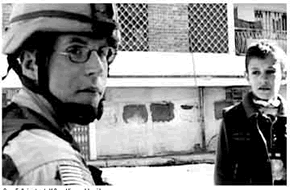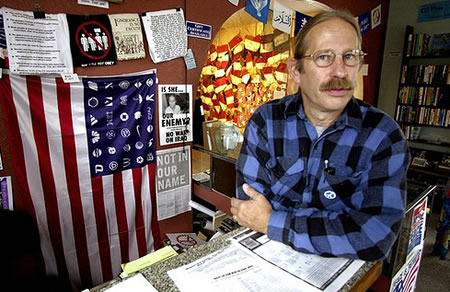 Old soldiers in the Civil War coined a phrase for green troops who survived their first taste of battle: "He has seen the elephant." This Army lieutenant sums up the combat experience better than many a grizzled veteran:
Old soldiers in the Civil War coined a phrase for green troops who survived their first taste of battle: "He has seen the elephant." This Army lieutenant sums up the combat experience better than many a grizzled veteran:
"Well, I'm here in Iraq, and I've seen it, and done it. I've seen everything you've ever seen in a war movie. I've seen cowardice; I've seen heroism; I've seen fear; and I've seen relief. I've seen blood and brains all over the back of a vehicle, and I've seen men bleed to death surrounded by their comrades. I've seen people throw up when it's all over, and I've seen the same shell-shocked look in 35-year-old experienced sergeants as in 19-year-old privates.
"I've heard the screams - 'Medic! Medic!' I've hauled dead civilians out of cars, and I've looked down at my hands and seen them covered in blood after putting some poor Iraqi civilian in the wrong place at the wrong time into a helicopter. I've seen kids with gunshot wounds, and I've seen kids who've tried to kill me.
"I've seen men tell lies to save lives: 'What happened to Sergeant A.?' The reply: 'C'mon man, he's all right - he's wondering if you'll be OK - he said y'all will have a beer together when you get to Germany.' SFC A. was lying 15 feet away on the other side of the bunker with two medics over him desperately trying to get either a pulse or a breath. The man who asked after SFC A. was himself bleeding from two gut wounds and rasping as he tried to talk with a collapsed lung. One of them made it; one did not.
"I've run for cover as fast as I've ever run - I'll hear the bass percussion thump of mortar rounds and rockets exploding as long as I live. I've heard the shrapnel as it shredded through the trailers my men live in and over my head. I've stood, gasping for breath, as I helped drag into a bunker a man so pale and badly bloodied I didn't even recognize him as a soldier I've known for months. I've run across open ground to find my soldiers and make sure I had everyone.
"I've raided houses, and shot off locks, and broken in windows. I've grabbed prisoners, and guarded them. I've looked into the faces of men who would have killed me if I'd driven past their IED (improvised explosive device) an hour later. I've looked at men who've killed two people I knew, and saw fear.
"I've seen that, sadly, that men who try to kill other men aren't monsters, and most of them aren't even brave - they aren't defiant to the last - they're ordinary people. Men are men, and that's it. I've prayed for a man to make a move toward the wire, so I could flip my weapon off safe and put two rounds in his chest - if I could beat my platoon sergeant's shotgun to the punch. I've been wanted dead, and I've wanted to kill.
"I've sworn at the radio when I heard one of my classmate's platoon sergeants call over the radio: 'Contact! Contact! IED, small arms, mortars! One KIA, three WIA!' Then a burst of staccato gunfire and a frantic cry: 'Red 1, where are you? Where are you?' as we raced to the scene ... knowing full well we were too late for at least one of our comrades.
"I've seen a man without the back of his head and still done what I've been trained to do - 'medic!' I've cleaned up blood and brains so my soldiers wouldn't see it - taken pictures to document the scene, like I'm in some sort of bizarre cop show on TV.
"I've heard gunfire and hit the ground, heard it and closed my Humvee door, and heard it and just looked and figured it was too far off to worry about. I've seen men lined up outside a house, ready to enter - some as scared as they could be, and some as calm as if they were picking up lunch from McDonald's. I've laughed at dead men, and watched a sergeant on the ground, laughing so hard he was crying, because my boots were stuck in a muddy field, all the while an Iraqi corpse was not five feet from him.
"I've heard men worry about civilians, and I've heard men shrug and sum up their viewpoint in two words - 'F--- 'em.' I've seen people shoot when they shouldn't have, and I've seen my soldiers take an extra second or two, think about it, and spare somebody's life.
"I've bought drinks from Iraqis while new units watched in wonder from their trucks, pointing weapons in every direction, including the Iraqis my men were buying a Pepsi from. I've patrolled roads for eight hours at a time that combat support units spend days preparing to travel 10 miles on. I've laughed as other units sit terrified in traffic, fingers nervously on triggers, while my soldiers and I deftly whip around, drive on the wrong side of the road, and wave to Iraqis as we pass. I can recognize a Sadiqqi (Arabic for friend) from a Haji (Arabic word for someone who has made the pilgrimage to Mecca, but our word for a bad guy); I know who to point my weapons at, and who to let pass.
"I've come in from my third 18-hour patrol in as many days with a full beard and stared at a major in a pressed uniform who hasn't left the wire since we've been here, daring him to tell me to shave. He looked at me, looked at the dust and sweat and dirt on my uniform, and went back to typing at his computer.
"I've stood with my men in the mess hall, surrounded by people whose idea of a bad day in Iraq is a six-hour shift manning a radio, and watched them give us a wide berth as we swagger in, dirty, smelly, tired, but sure in our knowledge that we pull the triggers, and we do what the Army does, and they, with their clean uniforms and weapons that have never fired, support us.
"I've given a kid water and Gatorade and made a friend for life. I've let them look through my sunglasses - no one wears them in this country but us - and watched them pretend to be an American soldier - a swaggering invincible machine, secure behind his sunglasses, only because the Iraqis can't see the fear in his eyes.
"I've said it a thousand times - 'God, I hate this country.' I've heard it a million times more - 'This place sucks.' In quieter moments, I've heard more profound things: 'Sir, this is a thousand times worse than I ever thought it would be.' Or, 'My wife and Sgt. B's wife were good friends - I hope she's taking it well.'
"They say they're scared, and say they won't do this or that, but when it comes time to do it they can't let their buddies down, can't let their friends go outside the wire without them, because they know it isn't right for the team to go into the ballgame at any less than 100 percent.
"That's combat, I guess, and there's no way you can be ready for it. It just is what it is, and everybody's experience is different. Just thought you might want to know what it's really like."
About the Writer
Joseph L. Galloway is the senior military correspondent for Knight Ridder Newspapers and co-author of the national best-seller "We Were Soldiers Once ... and Young." Readers may write to him at This email address is being protected from spambots. You need JavaScript enabled to view it.

 Activists in Humboldt County, California, in 2007, had experimented with a different approach to regulating military recruitment: a city ordinance introduced via citizen initiative.
Activists in Humboldt County, California, in 2007, had experimented with a different approach to regulating military recruitment: a city ordinance introduced via citizen initiative. Activists in a number of communities across the U.S. have succeeded in gaining restrictions on recruiting at the school district level.
Activists in a number of communities across the U.S. have succeeded in gaining restrictions on recruiting at the school district level. Though the
Though the  David Swanson is the author of the new book, Daybreak: Undoing the Imperial Presidency and Forming a More Perfect Union, by Seven Stories Press and of the introduction to The 35 Articles of Impeachment and the Case for Prosecuting George W. Bush by Dennis Kucinich. In addition to cofounding AfterDowningStreet.org, he is the Washington director of Democrats.com and sits on the boards of a number of progressive organizations in Washington, DC.
David Swanson is the author of the new book, Daybreak: Undoing the Imperial Presidency and Forming a More Perfect Union, by Seven Stories Press and of the introduction to The 35 Articles of Impeachment and the Case for Prosecuting George W. Bush by Dennis Kucinich. In addition to cofounding AfterDowningStreet.org, he is the Washington director of Democrats.com and sits on the boards of a number of progressive organizations in Washington, DC. Jorge Mariscal is the grandson of Mexican immigrants and the son of a U.S. Marine who fought in World War II. He served in the U.S. Army in Vietnam and currently teaches at the University of California, San Diego.
Jorge Mariscal is the grandson of Mexican immigrants and the son of a U.S. Marine who fought in World War II. He served in the U.S. Army in Vietnam and currently teaches at the University of California, San Diego. Matt Guynn plays the dual role of program director and coordinator for congregational organizing for On Earth Peace, building peace and nonviolence leadership within the 1000+ congregations of the Church of the Brethren across the United States and Puerto Rico. He previously served a co-coordinator of training for Christian Peacemaker Teams, serving as an unarmed accompanier with political refugees in Chiapas, Mexico, and offering or supporting trainings in the US and Mexico.
Matt Guynn plays the dual role of program director and coordinator for congregational organizing for On Earth Peace, building peace and nonviolence leadership within the 1000+ congregations of the Church of the Brethren across the United States and Puerto Rico. He previously served a co-coordinator of training for Christian Peacemaker Teams, serving as an unarmed accompanier with political refugees in Chiapas, Mexico, and offering or supporting trainings in the US and Mexico. Rick Jahnkow works for two San Diego-based anti-militarist organizations, the Project on Youth and Non-Military Opportunities and the Committee Opposed to Militarism and the Draft. He can be reached at:
Rick Jahnkow works for two San Diego-based anti-militarist organizations, the Project on Youth and Non-Military Opportunities and the Committee Opposed to Militarism and the Draft. He can be reached at:  Pat Elder was a co-founder of the
Pat Elder was a co-founder of the 